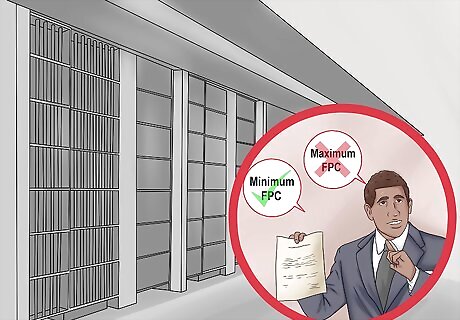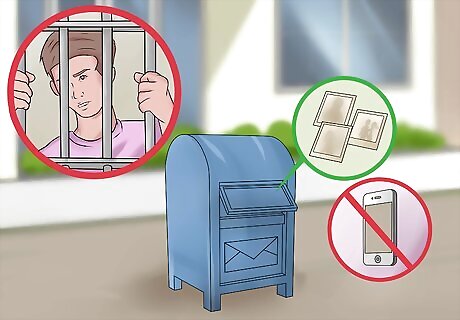
views
Preparing for Prison During Sentencing

Understand the designation process. After you are convicted of a federal crime, you will go through a process called sentencing. During sentencing, a judge will decide how much time you will spend in prison based on, among other things, the crime you were convicted of. After you are sentenced, the clerk of courts will transfer your information to the U.S. Marshals Service (USMS). Soon after, the USMS will request a designation from the Bureau of Prisons (BOP). The BOP will make an initial determination regarding where you will begin serving your sentence.

Request a minimum security federal prison camp (FPC). The BOP operates a number of different types of prison facilities, each one serving different purposes. The different facilities range from minimum security FPCs to maximum security prisons. During sentencing, have your attorney request that you be designated to an FPC. While it is ultimately BOP's decision as to where you go, a good word from the judge can go a long way. Minimum security FPCs are defined by their dormitory housing, a low staff-to-inmate ratio, and limited or no perimeter fencing. In addition, these institutions are often work and program oriented.

Ask for self-surrender. Depending on the seriousness of the crime you were convicted of, you may qualify for self-surrender. When you self-surrender, you will report to prison under your own control at a certain time and date. If you think this may be an option, ask about it during sentencing. Being able to self-surrender will help your designation as well.

Make sure your file is accurately represented.

Make sure your address is correct. During or just after sentencing, you will want to make sure the clerk of courts and the BOP has your correct address. The address they have on file will determine the institution you will report to. Typically, the BOP will try and place you in an institution within 500 miles (800 km) of the address you provide.

Start earning good time credit. If you have spent any time in confinement throughout your trial and sentencing processes, you may be able to earn good time credit, which will reduce your overall sentence and may help your designation. Good time credit can be given when you display "exemplary compliance" with regulations while in confinement. You may get up to 54 days off of your sentence if you get good time credit.
Getting Your Personal Affairs in Order

Make a budget. Before you head to prison, put together a budget for you and your family. Within the budget should be allocations for your children, your family, and yourself. You should write this information down and keep it with trustworthy family members. The more in-depth your budget is, the easier the transition will be for your family.

Take care of legal matters. If you have legal issues that need to be resolved, try getting them taken care of before you report to prison. Everything takes longer in prison because of all of the security protocols. Therefore, get these issues taken care of before you go to prison. For example, if you need to get something notarized, do so prior to sentencing. If you wait until you are in prison, you will have to notify prison employees of your need, fill out a form requesting money from your account to pay for the notarization, schedule an appointment, and mail the notarized documents.

Have some cash on hand. Before you report to prison, you will want to get some cash to go in with. Cash can be used in prison to pay for necessities and some convenience items. These things might include food, radios, and cigarettes. In general, you will want to bring up to $500. Be aware of the threat of theft and assault and do not bring too much cash.

Memorize phone numbers and addresses. When you report to prison you will not be able to bring much with you. Specifically, you will not be able to bring any address book or cell phone. Therefore, you will want to memorize important numbers and addresses. In general, you should remember your home number and the number of your attorney.

Put money in your prison account. If you are able to self-surrender, you will know your prison account number in advance of you being incarcerated. If this is the case, put money in your account ahead of time so it is available immediately upon your arrival. You will receive information about doing this soon after sentencing.

Mail things to yourself. If you are able to self-surrender, mail yourself a letter or two before you are incarcerated. In one of the letters, include important names and addresses. You can also mail yourself pictures of your family so you have some level of comfort while in prison. However, remember that all mail, except correspondence between you and your attorney, will be scrutinized and opened before it gets to you. Do not mail yourself items that are not allowed as they will get taken.
Preparing for Transfer

Be prepared for the worst. Even if your attorney thinks you will be able to self-surrender, you should prepare as if you are going to be taken into custody immediately after sentencing. The judge may have you taken into custody immediately and the USMS may take you straight to your facility. If you are taken into custody immediately, you will not have any time after sentencing to get your affairs in order.

Find your registration number. If you are allowed to voluntarily surrender, you will be notified of your BOP registration number about one week after sentencing. This number will be your identifier while you are in prison. You will have to use for everything from sending mail to putting money in your account.

Identify your surrender date and designated institution. When the court orders you to voluntarily surrender yourself, you will be notified by USMS of your surrender date and designated institution. In some circumstances, you will simply be told when and where to surrender to USMS themselves.

Bring only permitted items. When you report to prison, you will only be able to keep certain things in your possession. If you are voluntarily surrendering, you will be allowed to keep the following items: A plain wedding band; Plain earrings (for females only); Medical devices; Legal documents; Certain forms of identification; Religious items; and Prescription glasses. If you are taken into custody immediately after sentencing, you will be allowed to keep generally the same items but you must make sure to bring them with you to court. You will not be allowed to pick things up on your way to your designated facility.

Receive various assessments. When you get to prison, you will be given a medical assessment, psychiatric assessment, and a social interview. These things are designed to give the prison an idea of who you are and what they can expect from you. This process can take five hours or longer depending on your cooperation and other factors.

Remain patient. During processing, things might happen that delay your intake. For example, if there is a security issue in the prison or if the prison is short staffed, your processing might be delayed and you may spend a number of hours in a cell waiting. Be patient and courteous to prison staff during this process.




















Comments
0 comment